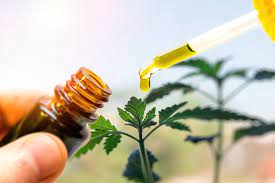How to Choose the Right CBD Product
Cannabidiol, or CBD, has quickly become a staple in the world of natural health products, offering a wide range of potential benefits from easing anxiety to managing pain. However, the ever-expanding market presents an overwhelming variety of CBD products, making it difficult to choose the right one. This guide will help you navigate the different types of CBD products, understand their benefits, and make an informed decision based on your needs.

Understanding CBD
Before exploring product options, it's essential to understand what CBD is and how it works. CBD is one of the many compounds found in the cannabis plant. Unlike THC, CBD is non-psychoactive, meaning it doesn't produce a "high." CBD interacts with the endocannabinoid system (ECS) in the human body, which regulates functions like sleep, mood, appetite, memory, and reproduction. By influencing the ECS, CBD may positively impact these processes. For a deeper dive into how CBD interacts with your body, check out this detailed guide on CBD and the endocannabinoid system.
Types of CBD Products
There is a vast array of CBD products available, each tailored to different needs and preferences. Here’s a closer look at some of the most popular types:
1. CBD Oils and Tinctures
CBD oils and tinctures are liquid forms of CBD that can be taken sublingually or added to food and drinks. They are versatile and quickly absorbed into the bloodstream when placed under the tongue.
2. CBD Edibles
CBD edibles, including gummies, chocolates, and beverages, offer a tasty and convenient way to consume CBD. However, the effects are slower to set in due to the digestive process.

3. CBD Capsules and Pills
These are perfect for those who prefer a precise dosage and convenience. Capsules can easily be incorporated into your daily routine, just like any other supplement.
4. CBD Topicals
CBD topicals, such as creams, lotions, and balms, are applied directly to the skin. They are commonly used for localized pain relief or skin conditions like eczema and psoriasis.
5. CBD Vapes
Vaping offers the quickest way to feel the effects of CBD, as it is directly inhaled into the lungs. However, due to concerns about the safety of vaping, many prefer other methods. For more on different CBD product types, visit Project CBD's comprehensive breakdown.
How to Choose the Right CBD Product for You
Choosing the right CBD product depends on several factors, including your health goals, lifestyle, and personal preferences. Here are some guidelines to help you make an informed choice:
1. Define Your Goals
Determine what you want to achieve with CBD. Whether it's pain relief, anxiety reduction, better sleep, or skincare, different products and dosages cater to various needs. For personalized advice, refer to CBD's potential benefits and uses.
2. Consider the Dosage
When starting with CBD, it’s crucial to begin with a low dose and gradually increase it until you find the optimal amount for your needs. Oils and tinctures are ideal for making dosage adjustments.

3. Assess the Bioavailability
Bioavailability refers to how much of the CBD enters your bloodstream. Vaping and sublingual oils offer higher bioavailability compared to edibles and topicals. For more information, check out CBD bioavailability comparisons.
4. Check for Third-Party Testing
Make sure the CBD product you're considering has been tested by a third-party lab for purity and potency. This ensures the product is free from harmful contaminants and contains the stated amount of CBD. Websites like ConsumerLab offer independent testing results.
5. Read Product Reviews
Customer reviews can provide valuable insights into a product's effectiveness and quality. Look for feedback on reputable sites like Trustpilot or reviews on Leafly.
6. Evaluate the Extraction Method
The extraction method used can impact the product's quality. CO2 extraction is considered the gold standard as it preserves CBD purity without introducing harmful chemicals.
Potential Side Effects of CBD
While CBD is generally regarded as safe, it can cause side effects such as dry mouth, reduced appetite, drowsiness, and fatigue. It may also interact with other medications, so consulting with a healthcare provider is recommended, especially if you're taking other drugs. Find comprehensive details on CBD side effects at Healthline.
Legal Considerations
CBD legality varies by country and region. In the U.S., hemp-derived products containing less than 0.3% THC are federally legal, but state laws may differ. For updated legal information, refer to Leafly’s guide on CBD legality by state.

Frequently Asked Questions
1. What is the difference between full-spectrum, broad-spectrum, and CBD isolate?
- Full-spectrum CBD contains all cannabinoids from the cannabis plant, including THC (though usually less than 0.3%).
- Broad-spectrum CBD includes multiple cannabinoids but excludes THC.
- CBD isolate is pure CBD with no other cannabinoids.
2. Can I take CBD while pregnant or breastfeeding?
Using CBD during pregnancy or breastfeeding is generally not recommended due to limited research on its safety. Always consult a healthcare provider. For more information, visit American Family Physician's article on CBD safety during pregnancy.
3. How long does it take for CBD to take effect?
The time it takes for CBD to take effect varies depending on the method of ingestion. Vaping and sublingual oils can take effect within minutes, while edibles may take one to two hours.
4. Will CBD show up on a drug test?
Most drug tests screen for THC, not CBD. However, full-spectrum products contain trace amounts of THC, which could potentially trigger a positive result.
5. How do I know if a CBD product is high quality?
Look for third-party lab reports, which should be available on the brand's website or upon request, to verify product quality and potency.
Choosing the right CBD product involves making informed decisions based on your individual needs, the product’s quality, and safety considerations. By following the guidance in this article, you can confidently select a CBD product that aligns with your health goals and lifestyle.

